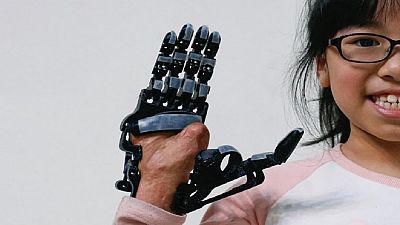South Africa
A team of electrical engineering students at South Africa’s University of Witwatersrand in Johannesburg, have been working on a prosthetic hand, which when perfected is expected to be affordable while still offering advanced features that can allow users greater human control.
Using 3D printing, the students say they can keep the cost of production low, compared to commercially available prosthetics with the same capabilities.
PhD candidate Abdul-Khaaliq Mohamed is the lead engineer for this project.
“The project started when I was doing my Masters research, I was looking for an application for control engineering in the body and I stumbled across this idea where you can control a robotic prosthetic hand with neural signals from the body. So I thought to myself that is something really valuable, imagine the case where a person doesn’t have a hand and here you provide them with this robotic prosthetic hand, and now all of a sudden they are able to do things they thought they would never be able to do again,” he said.
This kind of mobility technology is not entirely new but at the expected cost of 150 US dollars, it will have far reaching impact for amputees and people with impaired motor functions across the developing world.
Robotic limbs can cost over 10,000 US dollars.
The prosthetic hand is prompted by the movement of muscles controlled by the brain, allowing neural influence not seen in many of the basic models that are more widely available.
“Depending on where the level of amputation would be, it would either be connected to the forearm, or the bicep, or even the shoulder. The user will then intend to move the hand and initiate the movement of the hand by contracting one of these muscles, either the forearm or the bicep and then in the hand will then contract and produce a specific movement,” said Mohamed.
The innovation has already won the support of South Africa’s Amputee Club, a non-profit organization that put the number of amputees in the country at 2.1 million in 2011. Many, they say cannot afford prosthetics or find basic models too cumbersome and in some cases heavy.
The makers of this robot prosthetic have been working for the last three years on simple functions like holding a pen.
This year they have added sensors to the fingers to allow feeling of objects, whether they are soft or hard, cold or hot.
“The big advancement that we have brought to the hand this year was the ability to control the grip-strength of the hand, but more fundamentally was adding sensory feedback to the hand so that the patient or amputee could actually start feeling what the hand is feeling in the same way that the normal hand would be able to feel and also give them a much greater sense of embodying the hand,” said team member Nabeel Seedat.
The students say they hope the prototype can be tested on amputees within the next three years before it can be produced and sold commercially.
Reuters














00:30
England rugby team gear up ahead of their clash against Springboks
01:09
South Africa's Tyla wins big at MTV EMAs
Go to video
Why Mozambique's election has sparked weeks of protests and a violent crackdown by police
01:08
Prince William wraps up a four-day visit to Cape Town dedicated to the battle against climate change
01:10
South Africa, UK sign bilateral agreements, agree to bolster trade and defence ties
01:04
South Africa: Prince William meets young environmentalists